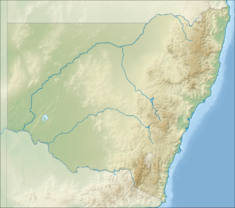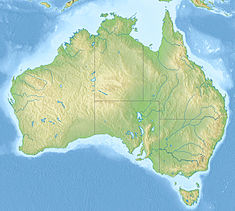
Loder House is a heritage-listed residence at 126 George Street, Windsor, City of Hawkesbury, New South Wales, Australia. It was built in 1834. It has been used at times for various other purposes: as a bank, multiple restaurants, a guesthouse and a bookshop. It was added to the New South Wales State Heritage Register on 2 April 1999.

Royal Hotel is a heritage-listed Australian pub at 59–61 Lambie Street, Cooma, Snowy Monaro Regional Council, New South Wales, Australia. It was built from 1858. It was added to the New South Wales State Heritage Register on 2 April 1999.
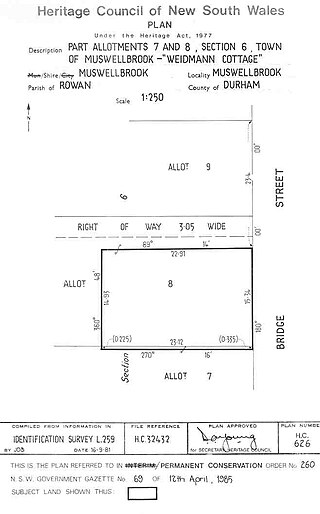
Weidmann Cottage is a heritage-listed former retail building, residence and town house and now unused building located at 132 Bridge Street, Muswellbrook in the Muswellbrook Shire local government area of New South Wales, Australia. It was built from 1840 to 1845. The property is owned by Muswellbrook Shire Council and was added to the New South Wales State Heritage Register on 2 April 1999.

Rose Cottage is a heritage-listed former cottage and now museum at Rose Street, Wilberforce, City of Hawkesbury, New South Wales, Australia. It was built from 1810 to 1820 by Thomas Rose. The property is owned by the Thomas and Jane Rose Family Society Inc. It was added to the New South Wales State Heritage Register on 2 April 1999.

Government Cottage Archaeological Site is the heritage-listed site of a cottage which served alternately as the base for the Colony of New South Wales' commandant of the Hawkesbury district, house of the district's magistrate and an "informal official residence" for the Governor of New South Wales when in the district. It is located at 41 George Street, Windsor, City of Hawkesbury, New South Wales, Australia. The original house was built from 1796 to 1815 and demolished c. 1920-21. It was also known as Commandant's House and Government House. It was added to the New South Wales State Heritage Register on 4 February 2011.

Macquarie Arms Hotel is a heritage-listed hotel at Thompson Square in Windsor, New South Wales, Australia. It is also known as the Royal Hotel. It was added to the New South Wales State Heritage Register on 2 April 1999.

Bowman House is a heritage-listed former residence and now Hawkesbury Area Office of the National Parks and Wildlife Service at 368-370 Windsor Street, Richmond, New South Wales, an outer suburb of Sydney, Australia. It was built from 1817 to 1820 by James Blackman. It is also known as Bowman's Cottage. It was added to the New South Wales State Heritage Register on 2 April 1999.

Mountain View is a heritage-listed residence at 22 Inalls Lane, Richmond, City of Hawkesbury, New South Wales, Australia. It was built from 1804 to 1870 by Lewis Jones and James Vincent. It is also known as Dight's Farm. It was added to the New South Wales State Heritage Register on 2 April 1999.
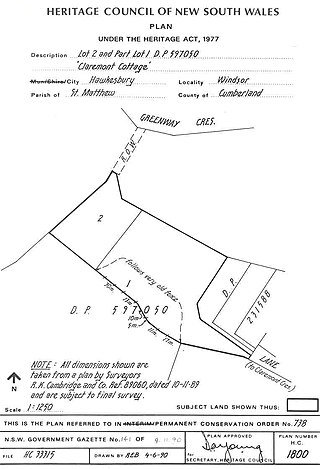
Claremont Cottage is a heritage-listed residence at Claremont Crescent, Windsor, New South Wales, an outer suburb of Sydney, Australia. It was built from 1807 to 1822. It was added to the New South Wales State Heritage Register on 2 April 1999.

Richmond Post Office is a heritage-listed former post office at 286 Windsor Street, Richmond, City of Hawkesbury, New South Wales, Australia. It was designed by Colonial Architect James Barnet and built from 1875 to 1888. The original building was built by a Mr. Johnson, with the second-story addition in 1888 added by Samuel Bought. It is also known as Richmond Telegraph and Post Office. It was added to the New South Wales State Heritage Register on 23 June 2000.

Australiana Pioneer Village is a heritage-listed open-air museum at Rose Street, Wilberforce, New South Wales, an outer suburb of Sydney, Australia. It was built from 1969 to 1970. The property is owned by the Hawkesbury City Council.

Windsor Court House is a heritage-listed courthouse at Court and Pitt Streets, Windsor, City of Hawkesbury, New South Wales, Australia. It was designed by Francis Greenway with a later extension by James Barnet and built from 1821 to 1822 by William Cox. It was added to the New South Wales State Heritage Register on 2 April 1999.
The North Street residences are a group of individually heritage-listed residences in North Street, Windsor, City of Hawkesbury, New South Wales, Australia. It is also known as the North Street Group. The cottages were added to the New South Wales State Heritage Register on 2 April 1999. They are often grouped with the adjacent former Court House Hotel building. The residence, along with the hotel, had previously been listed both jointly and individually on the former Register of the National Estate on 21 March 1978.
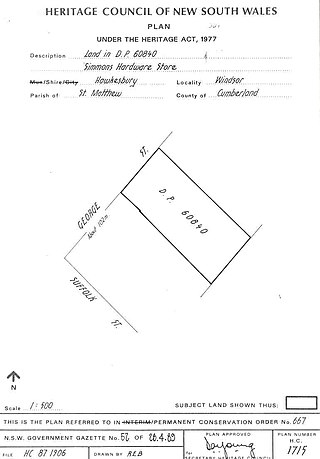
Simmons Hardware Store is a heritage-listed commercial building located at 226 George Street, Windsor, City of Hawkesbury, New South Wales, Australia. It is also known as Peter O'Hara's General Store and Simmons Store. It was added to the New South Wales State Heritage Register on 2 April 1999.

Peninsula House and Tebbutt's Observatory is a heritage-listed residence and former observatory at Palmer Street, Windsor, City of Hawkesbury, New South Wales, Australia. The observatory was built in 1845 by John Tebbutt. It was added to the New South Wales State Heritage Register on 2 April 1999.

5 Thompson Square is a heritage-listed residence and now offices at 5 Thompson Square, Windsor, City of Hawkesbury, New South Wales, Australia. It was added to the New South Wales State Heritage Register on 2 April 1999.

126 Windsor Street, Richmond is a heritage-listed residence in the outer Sydney suburb of Richmond, New South Wales, Australia. It is also known as the Home of John Town and Heritage Cottage. It was added to the New South Wales State Heritage Register on 2 April 1999.

Undercliffe Cottage is a heritage-listed residence located at 50 Argyle Place, in the inner city Sydney suburb of Millers Point in the City of Sydney local government area of New South Wales, Australia. It is also known as Undercliff Cottage; and Grimes Cottage. The property was added to the New South Wales State Heritage Register on 2 April 1999.

St Peter's Anglican Church is a heritage-listed Anglican church and associated Sunday school, rectory, and cemetery at 384 Windsor Street, Richmond, City of Hawkesbury, New South Wales, Australia. It was designed by Francis Clarke and Edmund Blacket and built from 1836 to 1841 by James Atkinson (church). It is also known as St Peter's Anglican Church Group, St Peter's Church Group, Church, Rectory, Church Yard, Cemetery and Stables. It was added to the New South Wales State Heritage Register on 16 August 2019; and on the City of Hawkesbury local government heritage register, and listed on the New South Wales Heritage Database on 12 September 2012.

Hadley Park is a heritage-listed former Aboriginal land, farm, dairy and gravel quarry and now unused building at 14-278 Old Castlereagh Road, Castlereagh, City of Penrith, New South Wales, Australia. It was built from 1803 to 1812. It was added to the New South Wales State Heritage Register on 20 April 2018.

